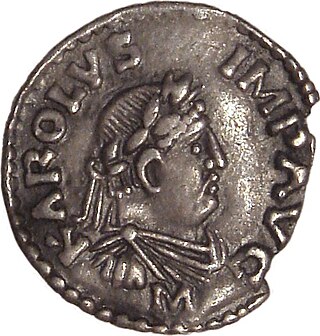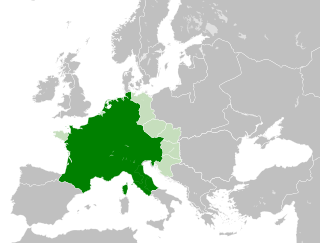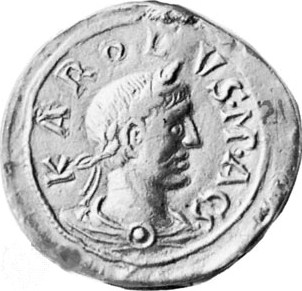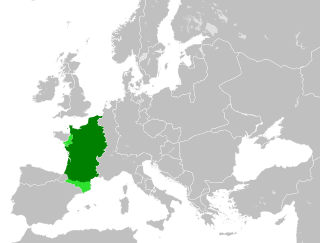
Charlemagne or Charles the Great, a member of the Carolingian dynasty, was King of the Franks from 768, King of the Lombards from 774, and was crowned as the Emperor of the Romans by the Papacy in 800. Charlemagne succeeded in uniting the majority of western and central Europe and was the first recognized emperor to rule from western Europe after the fall of the Western Roman Empire approximately three centuries earlier. The expanded Frankish state that Charlemagne founded was the Carolingian Empire, which is considered the first phase in the history of the Holy Roman Empire. He was canonized by Antipope Paschal III—an act later treated as invalid—and he is now regarded by some as beatified in the Catholic Church.

Louis the Pious, also called the Fair and the Debonaire, was King of the Franks and co-emperor with his father, Charlemagne, from 813. He was also King of Aquitaine from 781. As the only surviving son of Charlemagne and Hildegard, he became the sole ruler of the Franks after his father's death in 814, a position that he held until his death except from 833 to 834, when he was deposed.
The 810s decade ran from January 1, 810, to December 31, 819.

Year 814 (DCCCXIV) was a common year starting on Sunday of the Julian calendar, the 814th year of the Common Era (CE) and Anno Domini (AD) designations, the 814th year of the 1st millennium, the 14th year of the 9th century, and the 5th year of the 810s decade.

Year 778 (DCCLXXVIII) was a common year starting on Thursday of the Julian calendar, the 778th year of the Common Era (CE) and Anno Domini (AD) designations, the 778th year of the 1st millennium, the 78th year of the 8th century, and the 9th year of the 770s decade. The denomination 778 for this year has been used since the early medieval period, when the Anno Domini calendar era became the prevalent method in Europe for naming years.

The Carolingian Empire (800–888) was a Frankish-dominated empire in Western and Central Europe during the Early Middle Ages. It was ruled by the Carolingian dynasty, which had ruled as kings of the Franks since 751 and as kings of the Lombards in Italy from 774. In 800, the Frankish king Charlemagne was crowned emperor in Rome by Pope Leo III in an effort to transfer the Roman Empire from the Byzantine Empire to Western Europe. The Carolingian Empire is considered the first phase in the history of the Holy Roman Empire.

Charles III, also known as Charles the Fat, was the emperor of the Carolingian Empire from 881 to 888. A member of the Carolingian dynasty, Charles was the youngest son of Louis the German and Hemma, and a great-grandson of Charlemagne. He was the last Carolingian emperor of legitimate birth and the last to rule a united kingdom of the Franks.

The Kingdom of the Franks, also known as the Frankish Kingdom, the Frankish Empire or Francia, was the largest post-Roman barbarian kingdom in Western Europe. It was ruled by the Frankish Merovingian and Carolingian dynasties during the Early Middle Ages. Francia was among the last surviving Germanic kingdoms from the Migration Period era.

Nominoe or Nomenoe was the first Duke of Brittany from 846 to his death. He is the Breton pater patriae and to Breton nationalists he is known as Tad ar Vro.
Erispoe was Duke of Brittany from 851 to his death. After the death of his father Nominoe, he led a successful military campaign against the Franks, culminating in his victory at the Battle of Jengland. He is subsequently referred to as "King of Brittany".
Ermengarde of Hesbaye, probably a member of the Robertian dynasty, was Carolingian empress from 813 and Queen of the Franks from 814 until her death as the wife of the Carolingian emperor Louis the Pious.

In medieval history, West Francia or the Kingdom of the West Franks refers to the western part of the Frankish Empire established by Charlemagne. It was the forerunner of the future Kingdom of France and existed from 843 to 987. West Francia emerged from the partition of the Carolingian Empire in 843 under the Treaty of Verdun following the death of Charlemagne's son, Louis the Pious.

Theodulf of Orléans was a writer, poet and the Bishop of Orléans during the reign of Charlemagne and Louis the Pious. He was a key member of the Carolingian Renaissance and an important figure during the many reforms of the church under Charlemagne, as well as almost certainly the author of the Libri Carolini, "much the fullest statement of the Western attitude to representational art that has been left to us by the Middle Ages". He is mainly remembered for this and the survival of the private oratory or chapel made for his villa at Germigny-des-Prés, with a mosaic probably from about 806. In Bible manuscripts produced under his influence, the Book of Baruch and the Letter of Jeremiah became part of the Western (Vulgate) Bible canon.
Henry was the leading military commander of the last years of the Carolingian Empire. He was commander-in-chief under Kings Louis the Younger and Charles the Fat. His early career was mostly restricted to East Francia, his homeland, but after Charles inherited West Francia in 884 he was increasingly active there. During his time, raids by the Vikings peaked in Francia. The sources describe at least eight separate campaigns waged by Henry against the Vikings, most of them successful.
The Robertians are the proposed Frankish family which was ancestral to the Capetian dynasty, and thus to the royal families of France and of many other countries. The Capetians appear first in the records as powerful nobles serving under the Carolingian dynasty of Charlemagne in West Francia, which later became France. As their power increased, they came into conflict with the older royal family and attained the crown several times before the eventual start of the continuous rule of the descendants of Hugh Capet.
Wihomarc or Wiomarc'h was a Breton chieftain "who seemed to have greater authority than the other Breton leaders" and who revolted against Frankish overlordship in 822 and held on to his power until his death. His rebellion may have been incited by the creation of a Frankish county in Poutrocoet sometime between 818 and 820.
Wala was a son of Bernard, son of Charles Martel, and one of the principal advisers of his cousin Charlemagne, of Charlemagne's son Louis the Pious, and of Louis's son Lothair I. He succeeded his brother Adalard as abbot of Corbie and its new daughter foundation, Corvey, in 826 or 827.
The Battle of Jengland took place on 22 August 851, between the Frankish army of Charles the Bald and the Breton army of Erispoe, Duke of Brittany. The Bretons were victorious, leading to the signing of the Treaty of Angers in September 851 which secured Breton independence.

The Kingdom of Brittany was a short-lived vassal-state of the Frankish Empire that emerged during the Norse invasions. Its history begins in 851 with Erispoe's claim to kingship. In 856, Erispoe was murdered and succeeded by his cousin Salomon.











